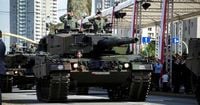LOT Polish Airlines has taken a significant step in expanding its fleet by signing an agreement for the lease of two Boeing 787-8 Dreamliners. This announcement was made by Minister Dariusz Klimczak on March 27, 2025, via social media. The deal, which has been confirmed by LOT's CEO, Michal Fijol, is seen as a crucial move amidst a global shortage of wide-body aircraft.
Fijol emphasized that the acquisition of the Dreamliners represents a vital investment in the airline's future development and competitiveness. He stated, "This investment aligns with our growth strategy and will enhance our operational capabilities." The Dreamliners are expected to be delivered in 2026, as reported by the Polish Press Agency (PAP).
Currently, the aircraft are in service with an undisclosed airline, but Fijol assured that the addition of these planes will significantly bolster LOT's ability to serve regional routes. He also mentioned that the airline has ordered a total of 84 aircraft, with the results of a bidding process for these regional jets expected to be announced in the coming weeks.
This strategic move comes at a time when the aviation market is experiencing intense competition, and LOT aims to increase its market share. The investment is not only about expanding the fleet but also about enhancing the overall passenger experience and operational efficiency.
Meanwhile, on the defense front, Poland's military capabilities have come under scrutiny. On March 26, 2025, Dariusz Lukowski, the Deputy Minister of National Defense, stated that Poland's armed forces have sufficient military equipment to withstand a potential attack for two weeks. This statement was reported by The Kyiv Independent and highlights the ongoing concerns regarding security in the region, particularly in light of the ongoing conflict in Ukraine.
Lukowski noted that the Polish military is equipped to face modern threats but acknowledged that the country still relies on some older equipment alongside newer systems. He pointed out that while Poland has been supplying a significant amount of military aid to Ukraine, careful calculations have been made to ensure that the Polish armed forces remain capable of defending the nation.
In response to concerns raised by opposition political groups about the state of Poland's military production, Lukowski clarified that the duration of defense depends on the type of weapons and ammunition available. He stated, "The defense could last between one to two weeks, depending on the situation on the battlefield and the current stock of weapons." This statement reflects the precarious balance Poland must maintain given its geographical proximity to Russia and Belarus.
Furthermore, Prime Minister Donald Tusk announced in March that the number of troops stationed along the border with Belarus has increased to 11,000. This move is part of Poland's broader strategy to enhance its defense posture amidst rising tensions in Eastern Europe.
In addition to troop deployments, Tusk has also proposed a voluntary military training program for adult men, aimed at bolstering the country’s defense readiness. This initiative reflects a growing recognition of the need for a prepared citizenry in the face of potential threats.
Poland's President Andrzej Duda has also been vocal about strengthening the military, advocating for the installation of nuclear weapons in Poland as a deterrent against potential aggression from Moscow. These developments underscore Poland's commitment to enhancing its defense capabilities while navigating the complex geopolitical landscape of Eastern Europe.
As Poland continues to grapple with its military readiness, the recent agreements in the aviation sector signal a dual focus on both economic growth and national security. The leasing of Dreamliners by LOT Polish Airlines not only positions the airline for future success but also reflects a broader trend of investment in strategic industries amidst global uncertainties.
In conclusion, LOT's acquisition of Boeing 787-8 Dreamliners marks a pivotal moment for the airline as it seeks to expand its fleet and improve competitiveness in the aviation market. Simultaneously, Poland's military preparedness remains a critical concern, with ongoing efforts to enhance defense capabilities in the face of regional threats. The interplay between these two sectors illustrates the multifaceted challenges and opportunities facing Poland today.

